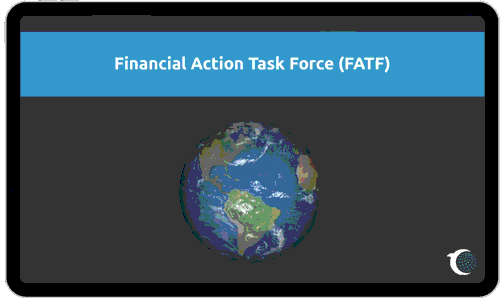AML Compliance for Small Businesses
Understanding Compliance Challenges and the Tools to Mitigate Them
📅 September 4, 2024
📅 September 4, 2024
Small businesses in the financial sector may face challenges in complying with anti-money laundering (AML) regulations, such as limited resources and difficulties maintaining the necessary expertise across multiple subject areas. Navigating these challenges is key for small businesses to protect their organizations through appropriate compliance controls and avoid potential violations.
The U.S. Financial Crimes Enforcement Network (FinCEN) established several laws in order to protect the financial system from financial crimes. The Bank Secrecy Act (BSA), established in 1970, became the foundation for other regulations and tools combatting money laundering. The BSA outlines regulations concerning recordkeeping and reporting for private individuals, banks, and financial institutions. These regulations aim to track the flow of currency and monetary instruments entering or leaving the United States or deposited in financial institutions. Key requirements include reporting cash transactions exceeding $10,000, accurately identifying individuals involved in transactions, and maintaining comprehensive records of financial activities.
Apart from federal regulations within the United States, individual states may impose their own specific AML requirements, further complicating compliance for small businesses within the financial sector that may be operating across state lines. In addition, different countries have their own AML regulations, making it challenging to ensure compliance across multiple jurisdictions. For example, countries in the European Union base their AML standards on the latest AML Directive in combination with the FATF Recommendations, and may add country-specific requirements too. Consequently, even sizable financial institutions with extensive compliance teams may encounter challenges staying up to date with continuously evolving global AML standards.
AML regulations are complex and constantly evolving. Small businesses may struggle to keep up with the changing regulatory landscape, leading to compliance gaps and potential legal or regulatory risks. While understanding the specific AML requirements within each company’s jurisdiction is crucial, it can be overwhelming for smaller enterprises. In addition to specific client, product, or jurisdictional requirements, an AML compliance program requires multiple elements to be effective including customer due diligence, ongoing review, transaction monitoring, sanctions screening, and investigation and reporting. This presents a significant resource requirement to build, operate, and maintain an effective compliance program.
One of the primary challenges for small businesses is limited resources. Unlike larger corporations with dedicated compliance teams, small businesses may lack the human and financial resources needed to establish robust AML frameworks. This can make it challenging to stay updated with evolving regulations and implement comprehensive compliance measures.
In September 2023, the Federal Reserve issued a cease-and-desist order against Small Business Bank and its holding company, Gardner Bancshares, due to various deficiencies found during an examination, including staffing, internal controls, credit risk management, and compliance issues. The Fed instructed the bank’s board to hire an independent third party to assess governance and staffing. The instruction from the Fed for the bank’s board to hire an independent third party to assess governance and staffing may indicate a lack of internal expertise and resources dedicated to AML compliance within Small Business Bank. This points to a common challenge for small businesses, which often struggle to allocate sufficient resources to regulatory compliance efforts.
Implementing robust AML technology solutions can be costly for small businesses. Traditional AML software often comes with hefty price tags and may require significant IT expertise to deploy and maintain. This can pose a barrier for smaller enterprises looking to enhance and scale their AML capabilities. For businesses engaged in international trade or online transactions, navigating cross-border AML compliance adds another layer of complexity.
Despite these challenges, there are steps small businesses can take to improve their AML compliance posture, such as education, training, outsourcing, and enhanced technologies. The most effective way to safeguard against money laundering is to have a robust AML compliance program built on a risk-based approach, which can help identify the vulnerabilities and potential risks within your organization.
While AML compliance poses challenges for small businesses, proactive measures and strategic initiatives can help mitigate risks and foster a culture of compliance. By staying informed, leveraging available resources, and embracing technology, small businesses can navigate the complexities of AML regulations more effectively.

Designed for all employees of financial institutions, our flagship eLearning course reviews the concepts of money laundering and terrorism financing as well as global standards, primary regulatory bodies, and enforcement actions.
Reach out to our team to schedule a demo.










 A Review of the Financial System Post 9/11
A Review of the Financial System Post 9/11This site uses cookies. By continuing to browse the site, you are agreeing to our use of cookies.
Accept settingsHide notification onlySettingsWe may request cookies to be set on your device. We use cookies to let us know when you visit our websites, how you interact with us, to enrich your user experience, and to customize your relationship with our website.
Click on the different category headings to find out more. You can also change some of your preferences. Note that blocking some types of cookies may impact your experience on our websites and the services we are able to offer.
These cookies are strictly necessary to provide you with services available through our website and to use some of its features.
Because these cookies are strictly necessary to deliver the website, refusing them will have impact how our site functions. You always can block or delete cookies by changing your browser settings and force blocking all cookies on this website. But this will always prompt you to accept/refuse cookies when revisiting our site.
We fully respect if you want to refuse cookies but to avoid asking you again and again kindly allow us to store a cookie for that. You are free to opt out any time or opt in for other cookies to get a better experience. If you refuse cookies we will remove all set cookies in our domain.
We provide you with a list of stored cookies on your computer in our domain so you can check what we stored. Due to security reasons we are not able to show or modify cookies from other domains. You can check these in your browser security settings.
These cookies collect information that is used either in aggregate form to help us understand how our website is being used or how effective our marketing campaigns are, or to help us customize our website and application for you in order to enhance your experience.
If you do not want that we track your visit to our site you can disable tracking in your browser here:
We also use different external services like Google Webfonts, Google Maps, and external Video providers. Since these providers may collect personal data like your IP address we allow you to block them here. Please be aware that this might heavily reduce the functionality and appearance of our site. Changes will take effect once you reload the page.
Google Webfont Settings:
Google Map Settings:
Google reCaptcha Settings:
Vimeo and Youtube video embeds:
You can read about our cookies and privacy settings in detail on our Privacy Policy Page.
Privacy Policy